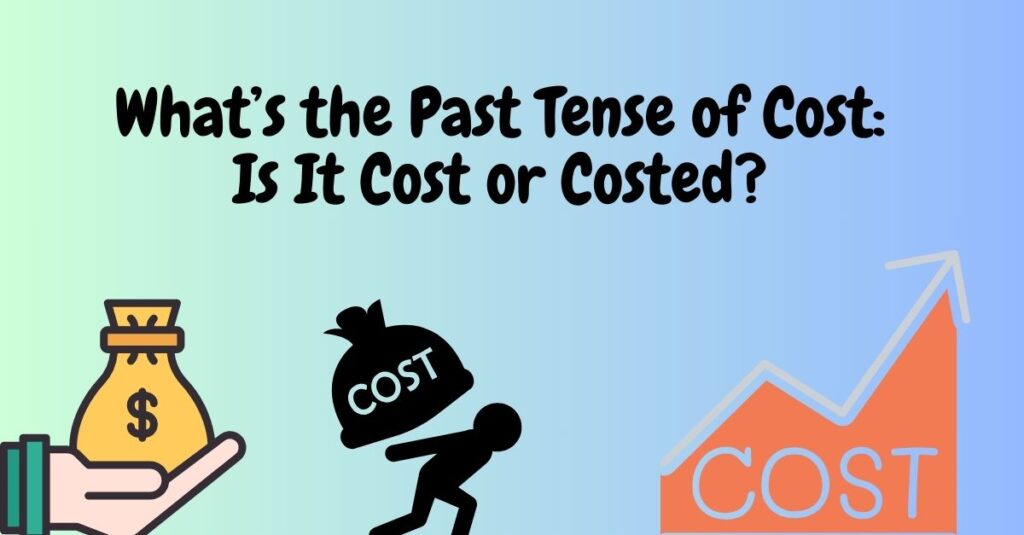Have you ever paused while writing and wondered: “What is the past tense of cost?” You’re not alone. This is one of those grammar quirks that trips up even native speakers. The English language is full of irregularities, and “cost” happens to be part of that club.
Let’s break it down and clear the confusion between “cost” and “costed” with real-world examples, proper verb tenses in English, and practical usage in different contexts like finance, grammar, and daily conversation.
Understanding the Base Form: What Does “Cost” Mean?
Before diving into tenses, it’s essential to understand the base form of “cost.”
The word “cost” functions as both a verb and a noun.
- As a verb, it refers to the act of requiring a payment or sacrifice.
Example: This jacket costs $80. - As a noun, it refers to the price or expense estimation of something.
Example: The cost of living in New York is high.
The real confusion begins when we shift this verb to the past tense.
So, What Is the Past Tense of Cost?
Here’s the direct answer:
The past tense of “cost” is usually “cost.”
That’s right—“cost” is an irregular verb, meaning it doesn’t follow the standard pattern of adding “-ed” for its past form. It stays the same in present, past, and even past participle forms.
✅ Correct usage:
- Present: The laptop costs a lot.
- Past: The laptop cost a lot last year.
- Past participle: It has cost us too much over the years.
Cost vs Costed – What’s the Difference?
Now, here’s where things get tricky. Many people ask: “Is it cost or costed?” The answer depends on the context.
- In most everyday and financial contexts, the correct past form is “cost.”
- But in technical, accounting, or project estimation contexts, “costed” is grammatically acceptable and often necessary.
Example 1: Common usage
- Incorrect: The phone costed me $500.
- Correct: The phone cost me $500.
Example 2: Technical or professional usage
- Correct: The new project was costed professionally by the finance team.
- Correct: The marketing plan was thoroughly costed during budgeting.
So, “costed” has its place—especially in cost estimation, project costing, and pricing analysis.
Costed Meaning in Accounting and Finance
In accounting, “costed” is more than just acceptable—it’s often necessary. When professionals evaluate or estimate expenses in a structured format, “costed” reflects that a formal cost breakdown or cost analysis has taken place.
Example:
Sarah’s team costed the event using a detailed budget worksheet, considering every aspect from venue to catering.
Here, costed fits the financial vocabulary. It’s not about price alone but about calculating, estimating, and forecasting financial needs. This is part of professional budgeting terms.
Grammatical Usage and English Verb Confusion
Now, you might be thinking: “Why do some verbs like ‘cost’ never change, while others do?”
Welcome to the world of irregular verbs and verb confusion.
Regular vs. Irregular Verbs:
- Regular verbs form their past tense by adding “-ed” (e.g., walk → walked).
- Irregular verbs, like cost, follow their own patterns (or lack thereof).
Some other irregular verbs similar to cost:
- Hit → Hit
- Cut → Cut
- Put → Put
So the next time you’re puzzled by cost grammar, remember: It behaves just like hit and cut.
Cost Verb Tense Table: Quick Reference
Here’s a handy table to make it crystal clear:
| Tense | Verb Form | Example |
|---|---|---|
| Base Form | cost | I always cost my services fairly. |
| Present Tense | cost(s) | The product costs $30. |
| Past Tense | cost | The repair cost him a fortune. |
| Past Participle | cost | It has cost them dearly. |
| Technical Usage | costed | The event was costed by experts. |
Examples With Cost in Sentences
To further help you master this verb, here are real-life past tense examples and cost verb examples.
- Jake’s new car cost him nearly $40,000.
- The renovation project was costed by an engineer named Maria.
- It has cost the company thousands in lost revenue.
- They carefully costed the new software deployment.
- Emily said the necklace cost her just $25.
When Should You Use “Costed” Instead of “Cost”?
Still unsure when to choose “costed”? Here’s a simple guideline:
Use “cost” when:
- You’re referring to the price paid or charged.
- You’re writing in casual, everyday, or general contexts.
Use “costed” when:
- You’re describing a detailed estimation process.
- You’re in a business, project management, or finance setting.
- You’re referencing project costing or cost structure planning.
Cost Grammar in Professional Jargon
In fields like finance, accounting, or construction, technical usage of costed is not only grammatically correct but expected. For instance:
- The accountant costed the proposed changes to ensure they fit the quarterly budget.
- We had the house costed before deciding on renovations.
These phrases sound natural in the world of professional jargon.
Helpful Analogies to Remember the Rule
Think of “cost” like the verb “hit.”
You wouldn’t say “He hitted the ball,” right?
Likewise, you don’t say “The shoes costed me $50” unless you’re estimating or calculating them professionally.
Remember:
“Cost” = Common Past Tense
“Costed” = Financial/Analytical Context
Final Thoughts: Mastering Cost in All Its Forms
English can be quirky. But once you know the rules (and exceptions), it gets easier to write and speak correctly.
Let’s recap:
- The past tense of cost is almost always cost.
- Costed is only correct in specific technical or financial contexts.
- Recognize the difference between price vs cost, especially when estimating or calculating.
- In casual speech, avoid saying “costed”—it may sound awkward or incorrect.
Understanding English verb usage doesn’t have to be a chore. Keep practicing with real examples, and the difference between cost vs costed will become second nature.

